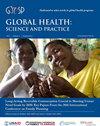战略培训执行计划 2.0:针对中低收入国家卫生供应链的领导力和变革管理计划。
IF 2.5
3区 医学
Q2 PUBLIC, ENVIRONMENTAL & OCCUPATIONAL HEALTH
引用次数: 0
摘要
人的奉献 "组织的愿景是 "建立一个世界,在这个世界里,医疗卫生供应链的工作人员能够通过提高医疗卫生商品的可及性,优化医疗卫生成果。然而,在许多中低收入国家,卫生供应链管理(HSCM)并不是一个公认的专业。要想显著改善这些国家的卫生成果,就必须努力实现 HSCM 的专业化;这意味着要将供应链管理转变为公认的最高诚信职业。"战略培训执行计划"(STEP)创建于 2016 年,旨在解决当前领导风格方面的差距。从那时起,STEP 经过了严格的修订,以提高其在低收入与中等收入国家的适用性、可扩展性和实用性。迄今为止,各种形式的 STEP 已在 30 个国家实施,为 600 多名医疗供应链专业人员的供应链能力建设做出了贡献。本案例研究讨论了第二代 STEP(STEP 2.0)的设计和持续发展历程。本案例研究讨论了第二代 STEP(STEP 2.0)的设计和持续发展历程。这一历程以创新的方式展示了在全球封锁和卫生紧急状态下,不同组织如何积极合作,重新构想一个被所有组织公认为对流行病后供应链系统至关重要的计划。本文章由计算机程序翻译,如有差异,请以英文原文为准。
Strategic Training Executive Program 2.0: A Leadership and Change Management Program for Health Supply Chains in Low- and Middle-Income Countries.
People that Deliver's vision is "a world where health supply chain workforces are empowered and equipped to optimize health outcomes by improving access to health commodities." However, health supply chain management (HSCM) is not a recognized profession in many low- and middle-income countries (LMICs). HSCM professionalization efforts are essential if health outcomes are to be significantly improved in these countries; this means transforming supply chain management into a recognized profession of the highest integrity.The Strategic Training Executive Program (STEP) was created in 2016 to address prevailing leadership style gaps. Since then, STEP has undergone rigorous revisions to improve its applicability, scalability, and usefulness in LMICs. To date, STEP-in all its forms-has been delivered to 30 countries and contributed to building the supply chain capacities of more than 600 health supply chain professionals.This case study discusses the evolution journey of designing and sustaining the second generation of STEP (STEP 2.0). This journey is an innovative illustration of how diverse yet motivated organizations collaborated during a global lockdown and health emergency to reimagine a program recognized by all as essential for post-pandemic supply chain systems.
求助全文
通过发布文献求助,成功后即可免费获取论文全文。
去求助
来源期刊

Global Health: Science and Practice
Medicine-Health Policy
CiteScore
3.50
自引率
7.50%
发文量
178
审稿时长
22 weeks
期刊介绍:
Global Health: Science and Practice (GHSP) is a no-fee, open-access, peer-reviewed, online journal aimed to improve health practice, especially in low- and middle-income countries. Our goal is to reach those who design, implement, manage, evaluate, and otherwise support health programs. We are especially interested in advancing knowledge on practical program implementation issues, with information on what programs entail and how they are implemented. GHSP is currently indexed in PubMed, PubMed Central, POPLINE, EBSCO, SCOPUS,. the Web of Science Emerging Sources Citation Index, and the USAID Development Experience Clearinghouse (DEC).
TOPICS:
Issued four times a year, GHSP will include articles on all global health topics, covering diverse programming models and a wide range of cross-cutting issues that impact and support health systems. Examples include but are not limited to:
Health:
Addiction and harm reduction,
Child Health,
Communicable and Emerging Diseases,
Disaster Preparedness and Response,
Environmental Health,
Family Planning/Reproductive Health,
HIV/AIDS,
Malaria,
Maternal Health,
Neglected Tropical Diseases,
Non-Communicable Diseases/Injuries,
Nutrition,
Tuberculosis,
Water and Sanitation.
Cross-Cutting Issues:
Epidemiology,
Gender,
Health Communication/Healthy Behavior,
Health Policy and Advocacy,
Health Systems,
Human Resources/Training,
Knowledge Management,
Logistics and Supply Chain Management,
Management and Governance,
mHealth/eHealth/digital health,
Monitoring and Evaluation,
Scale Up,
Youth.
 求助内容:
求助内容: 应助结果提醒方式:
应助结果提醒方式:


